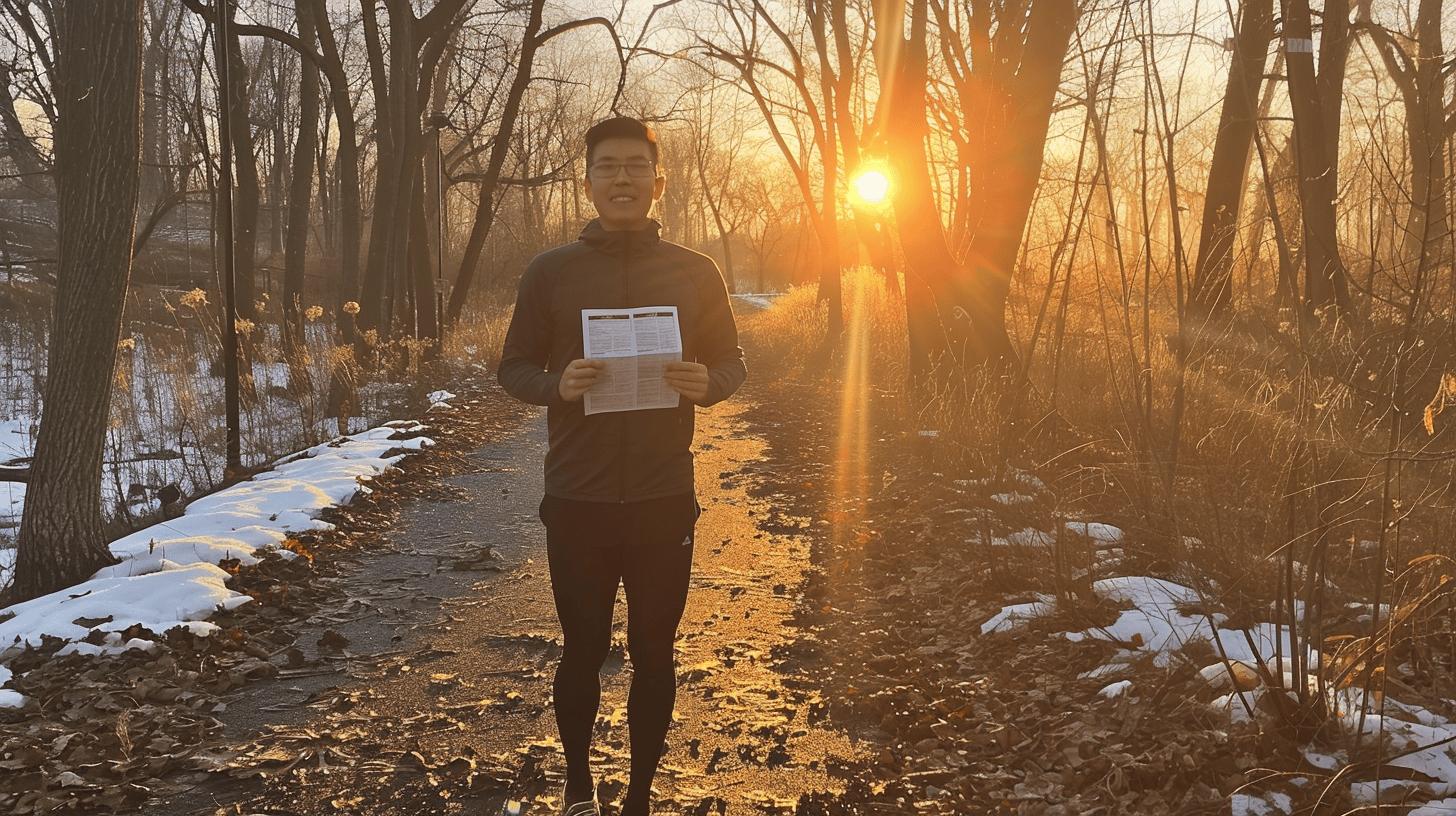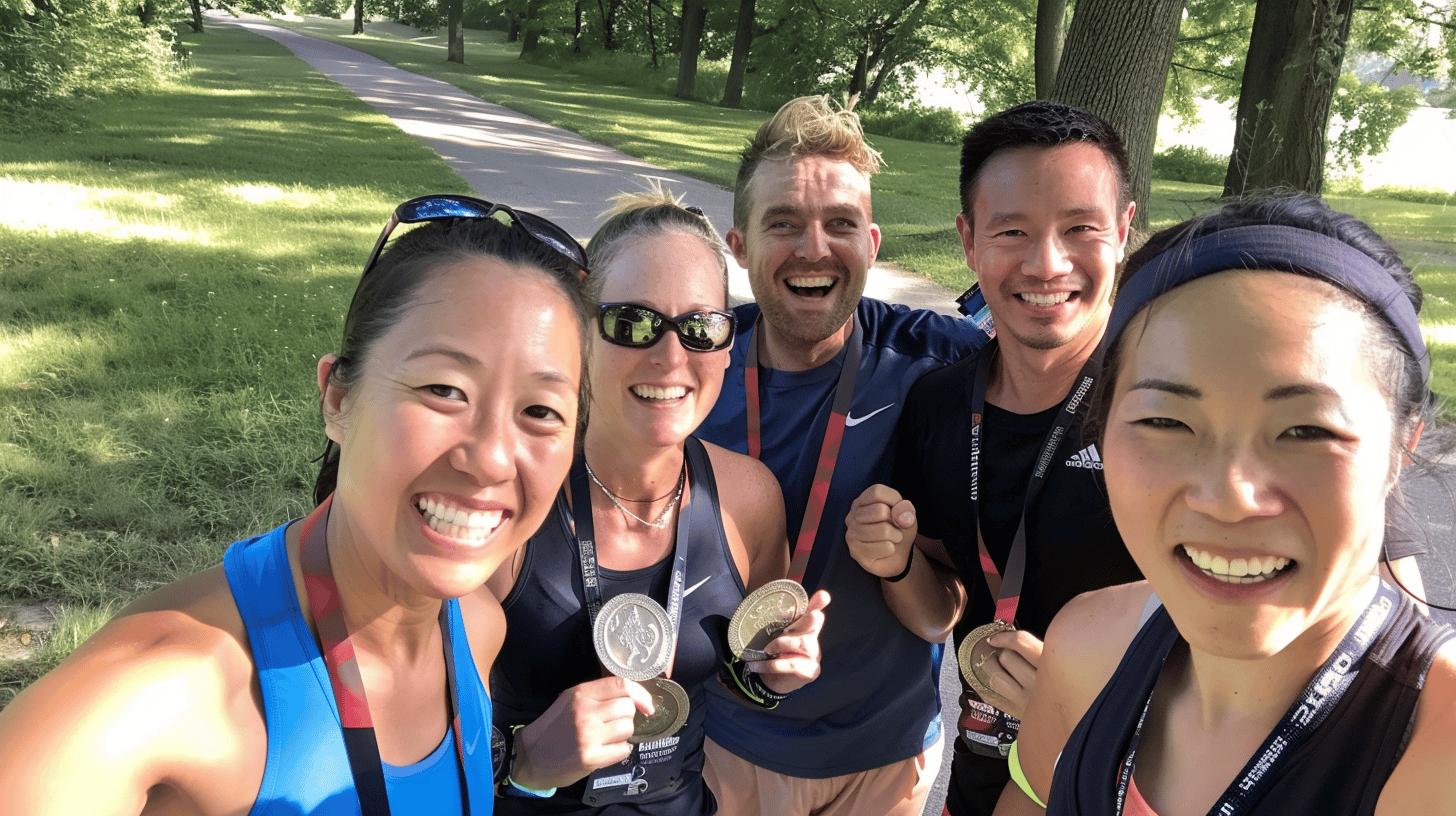Ever wondered how long it takes a beginner to run a 10k? The answer might surprise you. Many new runners worry about whether they can complete the distance. But understanding expected times can ease these concerns and set realistic goals. This quick guide breaks down the typical 10k run times for beginners, offering a range of what you can expect based on average statistics. Whether you're just starting or preparing for your first race, knowing these benchmarks can help you approach your training with confidence and clarity. Let's dive in!
What is a Typical 10k Time for Beginners?
Beginners typically take between 30 to 60 minutes to run a 10K, though this can vary widely based on individual fitness levels and training. For new runners, incorporating run-walk methods often extends the completion time. Generally, first-time 10k runners can expect to finish in about 1 hour to 1 hour and 15 minutes.
- Men: The average 10k time is 1:05:30 (10:32 min/mile pace).
- Women: The average 10k time is 1:13:58 (11:54 min/mile pace).
- Run-Walk Method: Often results in times closer to 1 hour and 30 minutes.
- Well-Trained Beginners: Can achieve times closer to 50 minutes to 1 hour.
Understanding these average times helps set realistic goals. Men generally finish faster than women, and those using run-walk methods take longer. Beginners should consider aiming for a time within the 1 hour to 1 hour and 15 minutes range for their first 10k.
Factors Affecting 10k Run Times for Beginners
Understanding the factors that influence 10k run times for beginners is crucial for setting realistic and achievable goals. Various elements, such as individual fitness levels, age, gender, training consistency, and running techniques, play a significant role in determining how long it will take for a beginner to complete a 10k race.
Individual fitness levels highly impact 10k completion times. Those with a higher baseline of cardiovascular and muscular fitness generally perform better. Age also influences performance, with younger runners often having an advantage due to better recovery rates and overall physical capacity. Gender differences are evident, as men typically have more muscle mass and higher oxygen-carrying capacity, often leading to faster times compared to women.
Training consistency and running technique are other critical factors. Regular and structured training helps build endurance and speed, while proper running techniques can prevent injuries and improve efficiency. Nutrition and recovery also play essential roles; balanced diets and adequate rest periods enable the body to perform optimally and recover efficiently after training sessions.
| Factor | Impact |
|---|---|
| Fitness Level | Higher fitness levels lead to better performance and faster times. |
| Age | Younger runners often have better recovery rates and physical capacity. |
| Gender | Men typically finish faster due to higher muscle mass and oxygen capacity. |
| Training Consistency | Regular training builds endurance and speed. |
How to Train for a 10k as a Beginner

A structured training plan is crucial for beginners aiming to complete a 10k race successfully. A well-organized plan not only ensures steady progress but also helps prevent injuries and burnout. An eight-week training period is generally recommended, with three to four runs per week that incorporate varied paces, terrains, and techniques. Establishing a solid base by comfortably running shorter distances, such as a 5K, is an essential first step before diving into more intense 10k training.
Building a strong foundation begins with base-building, which involves gradually increasing mileage to enhance cardiovascular fitness and muscular endurance. This phase typically lasts for the first few weeks and focuses on easy, steady runs. Varied workouts are essential for a well-rounded plan. These include tempo runs to improve lactate threshold, interval training for speed, and long runs to build endurance. Proper nutrition and hydration are equally important, as they fuel the body for rigorous training and aid in recovery. Consuming a balanced diet rich in carbohydrates, proteins, and healthy fats will optimize performance.
Recovery is an often-overlooked aspect of training but is vital for preventing injuries and maintaining long-term progress. Incorporating rest days, cross-training, and adequate sleep into the training schedule allows the body to repair and strengthen. Stretching, foam rolling, and low-impact activities like swimming or cycling can also aid in recovery.
- Start with a base-building phase, focusing on easy runs.
- Incorporate varied workouts: tempo runs, intervals, and long runs.
- Prioritize proper nutrition and hydration.
- Schedule rest days and cross-training.
- Use stretching and foam rolling for recovery.
- Gradually increase mileage to avoid overtraining.
- Listen to your body and adjust the plan as needed.
A well-rounded training plan that includes these elements will prepare beginners to tackle a 10k race with confidence and efficiency.
Sample 10k Training Schedule for Beginners
A balanced training schedule is vital for beginners aiming to complete a 10k race. It ensures gradual progress, prevents injuries, and keeps motivation high. Beginners should avoid back-to-back hard workouts, such as speed work and long runs, to allow sufficient recovery time. Incorporating varied workouts into the weekly plan helps target different aspects of fitness and keeps training engaging. A typical training plan spans 8 to 10 weeks, gradually building up to the 10k distance.
The training schedule should include different types of workouts to build endurance, speed, and overall stamina. Varied Paces Day focuses on running at different speeds for 20-30 minutes, helping runners adapt to various paces. Tempo/Speed Work Day involves one quality speed session per week, crucial for improving overall pace and performance. Long Run Day is essential for building up the distance over time and should be approached gradually. Fun Run Day serves as a low-pressure run focused on the joy of running, helping to maintain enthusiasm and motivation.
| Day | Workout |
|---|---|
| Monday | Rest or Cross-Training |
| Tuesday | Varied Paces Day (20-30 minutes) |
| Wednesday | Easy Run (30 minutes) |
| Thursday | Tempo/Speed Work Day |
| Friday | Rest or Cross-Training |
| Saturday | Long Run Day (progressively building distance) |
| Sunday | Fun Run Day |
Tips to Improve 10k Running Performance for Beginners
Improving 10k running performance is essential for beginners aiming to achieve their best possible time. Performance enhancement not only boosts confidence but also contributes to a more enjoyable racing experience. By incorporating specific training strategies, beginners can significantly improve their 10k times and overall running efficiency.
Weekly long runs are a cornerstone of any effective training plan. These runs build endurance, allowing runners to sustain a steady pace over the 10k distance. Speed work should also be integrated into the training regime. This involves running slightly faster than the target 10k pace, with intervals of strong running followed by recovery walks. Such sessions help increase lactate threshold and improve overall speed. Strength training and cross-training are equally important, as they enhance muscular strength and reduce the risk of injury. Activities like cycling, swimming, or using resistance bands can complement running workouts.
Easy runs are crucial for recovery and should not be overlooked. They enable the body to adapt to the increased workload while preventing burnout. These runs should be conducted at a comfortable pace, allowing the runner to focus on maintaining proper form and breathing techniques. Additionally, incorporating tempo runs, which are sustained efforts at a challenging but manageable pace, can further enhance endurance and speed.
- Incorporate weekly long runs to build endurance.
- Add speed work sessions to improve pace and lactate threshold.
- Include strength training to enhance muscular strength.
- Use cross-training activities like cycling or swimming.
- Perform easy runs for recovery and adaptation.
- Incorporate tempo runs for sustained, challenging efforts.
- Focus on maintaining proper form and breathing techniques.
By following these tips, beginners can effectively improve their 10k running performance, paving the way for better race outcomes and a more enjoyable running experience.
Success Stories and Testimonials from Beginner 10k Runners

Success stories from beginner 10k runners offer valuable insights and motivation for those just starting their running journey. These testimonials highlight the dedication and perseverance required to complete a 10k, demonstrating that with the right mindset and training, anyone can achieve this milestone. Hearing about others' experiences can inspire new runners to set realistic goals and stay committed to their training plans.
- John, 34: "I never thought I could run a 10k, but with consistent training and support from my local running group, I finished my first race in 1 hour and 5 minutes. It was an incredible feeling!"
- Sarah, 29: "Running a 10k seemed daunting at first, but following a structured training plan helped me stay on track. Crossing the finish line in 1 hour and 15 minutes was a huge accomplishment."
- Alex, 40: "As a complete beginner, I started with a run-walk method. Over time, I built up my endurance and completed my first 10k in 1 hour and 20 minutes. It was a proud moment for me."
- Emily, 25: "Joining a virtual 10k race gave me the motivation I needed. I trained for eight weeks and finished in 1 hour and 10 minutes. The support from the online community was amazing."
- Mike, 37: "I focused on improving my running technique and nutrition. After three months of training, I ran my first 10k in 55 minutes. The journey was tough but rewarding."
These success stories underscore the importance of dedication, proper training, and community support. They show that regardless of starting point or pace, completing a 10k is an achievable and rewarding goal for beginner runners.
Final Words
Discovering how long to run 10k for a beginner involves understanding average times, factors affecting performance, and effective training plans. Beginners generally take between 1 hour to 1 hour and 15 minutes to complete a 10k.
Key factors such as fitness level, age, and training consistency play pivotal roles in determining completion time.
Adopting a structured training plan and incorporating varied workouts are essential for improvement.
Embarking on this journey, beginners can aim to build endurance, gain confidence, and ultimately achieve their running goals.
FAQ
How long to run 10k beginner female?
A beginner female typically takes about 1 hour and 13 minutes to run a 10k, averaging an 11:54 min/mile pace.
What is a good 10k time by age?
A good 10k time varies with age. For younger runners, a time under 50 minutes is often considered good, while older runners may aim for anything under 1 hour.
How long is a 10k run in miles?
A 10k run is approximately 6.2 miles.
How long is a 10k run in minutes?
Beginners can expect to complete a 10k run in about 60 to 75 minutes.
How long to train for a 10k from nothing?
Training for a 10k from scratch typically takes around 8 weeks, assuming a commitment to consistent running.
8-week 10k training plan beginner pdf
You can find various 8-week 10k training plans for beginners in PDF format online, featuring structured workouts, rest days, and tips.
10k running plan for beginners pdf
Numerous websites offer downloadable PDF running plans for beginners preparing for a 10k, including detailed schedules and training advice.
How long to train for 10K from 5k?
Transitioning from a 5k to a 10k generally requires about 6-8 weeks of additional training.
How quickly can you learn to run 10k?
A person can learn to run a 10k within 8-10 weeks with a structured training plan.
What is a good 10k time for a beginner woman?
A good 10k time for a beginner woman is around 1 hour and 13 minutes, at an 11:54 min/mile pace.
Can you learn to run 10k in 2 weeks?
Learning to run a full 10k in just 2 weeks is highly ambitious; a longer, structured training period is recommended.
Can I run 10km without training?
Running 10km without training is not advisable, as it could lead to injury or extreme fatigue. Proper training is key.

